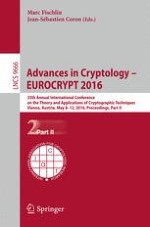2016 | OriginalPaper | Buchkapitel
Two Round Multiparty Computation via Multi-key FHE
verfasst von : Pratyay Mukherjee, Daniel Wichs
Erschienen in: Advances in Cryptology – EUROCRYPT 2016
Verlag: Springer Berlin Heidelberg
Aktivieren Sie unsere intelligente Suche, um passende Fachinhalte oder Patente zu finden.
Wählen Sie Textabschnitte aus um mit Künstlicher Intelligenz passenden Patente zu finden. powered by
Markieren Sie Textabschnitte, um KI-gestützt weitere passende Inhalte zu finden. powered by
